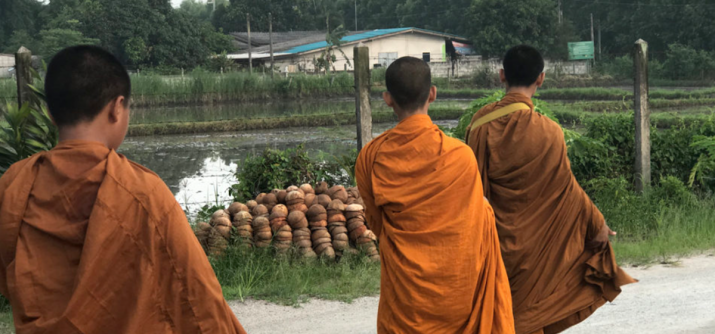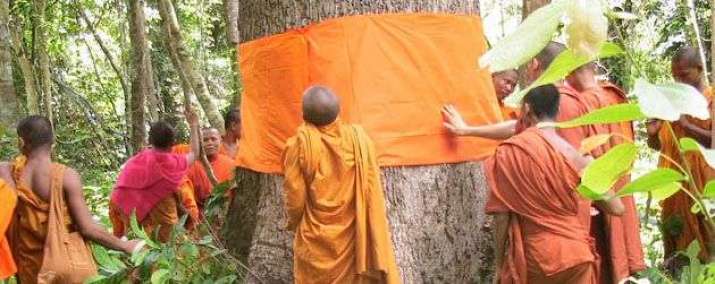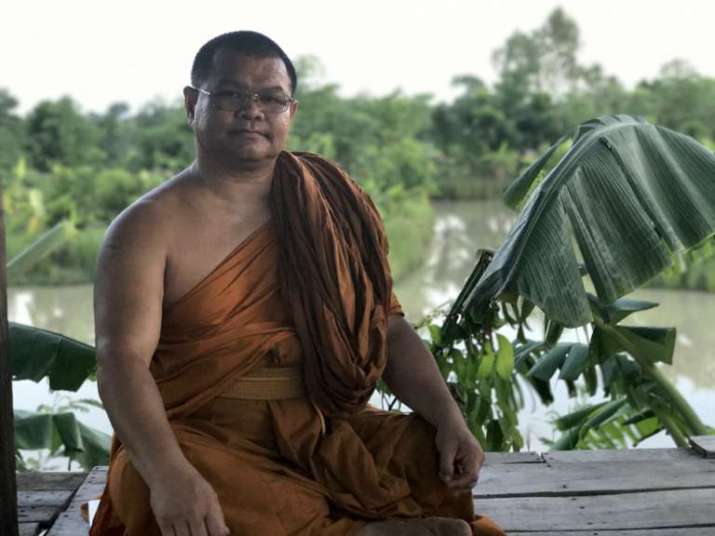NEWS
Buddhist “Eco-monks” Work to Protect Thailand’s Environment
 From mongabay.com
From mongabay.comAs Thailand’s economy develops and grows, maintaining the delicate ecological balance remains a major challenge. As a consequence of extensive deforestation and widespread dam projects, the country is regularly affected by both flooding and droughts, but some Buddhist monks are actively working to protect the environment by integrating Buddhist principals with environmental awareness, consulting with government officials about environmental problems, and implementing sustainability projects, such as installing solar panels at Buddhist temples and helping villagers fashion environmentally friendly cottages out of mud and other naturally available materials.
“There are places in northern Thailand, particularly in Nan Province, where there has been a lot of deforestation, so the watersheds areas fill the water with mud, silt, and pesticide runoff causing more severe flooding in the rainy season and more severe drought in the dry season,” said Gordon Congdon, conservation program manager for WWF-Thailand. (Mongabay)
The environmental and conservation activities of monks in northern Thailand also extend to performing tree ordination ceremonies. Tree ordination, adopted from traditional Buddhist practices, is a popular practice in many Buddhist-majority countries seeking to reduce deforestation and establish wildlife reserves. Trees are given monastic ordination and wrapped in the iconic saffron cloth worn by Theravada monks, making them sacred and thereby protecting the trees from damage, destruction, and deforestation.
“Making merit is extremely important for Thai Buddhists,” said Dr. Susan Darlington, professor of anthropology and Asian studies at Hampshire College in Massachusetts and author of The Ordination of a Tree: The Thai Buddhist Environmental Movement (Suny Press 2013). “They see [tree-ordination ceremonies] as an act of making merit, which can help with rebirth and, in some cases, having a better life now.” (Mongabay)
 In a bid to make merit and discourage deforestation, trees are ordained and wrapped in the saffron cloth of a monk’s robe. From humanlife.asia
In a bid to make merit and discourage deforestation, trees are ordained and wrapped in the saffron cloth of a monk’s robe. From humanlife.asiaDr. Chaya Vaddhanaphuti, a geography professor at Chiang Mai University whose PhD studies focused on climate change, said one of the most harmful environmental issues in modern Thailand is the lack of knowledge and awareness. “When I lived with the farmers during my PhD studies, they never used the term climate change,” she recalled. “However, they knew that the climate had changed from how it was affecting their farms.” (Mongabay)
To teach rural farmers about the need to protect the environment, Phrakhu Sangkom Thanapanyo Khunsuri, a prominent eco-monk based in Chiang Mai has established a traditional farming school at his temple in the eastern province of Chonburi called the Maab-Euang Meditation Center for Sufficiency Economy. With 49 full-time students this year, Phra Sangkom is teaching Buddhist concepts of personal reflection and a theory called the “sufficiency economy developed by the late Thai monarch Bhumibol Adulyadej, which promotes subsistence farming, encourages self-sufficiency, and teaches a detachment from materialism and consumerism.
“If the people understand that the jungle gives them oxygen, water, good food, medicine, and clothes, do you think they are going to help protect it?” Phra Sangkom asked. “Of course!”
In the Thai capital Bangkok, another eco-monk, Phrakhu Win Mektripop, who holds a master’s degree in environmental economics from Thailand’s Chulalongkorn University, emphasized one of the direct links between Buddhism and environmentalism: “When the Buddha was born, he was born under the tree. He was enlightened under the tree. His first sermon was under the tree. We can see that most of his life was related to the forest.” (Asian Correspondent)
However, the WWF’s Congdon observed that as Thailand continues to develop from a low-income to an upper-income country, sustainability has often fallen by the wayside. Many large corporations and conglomerates, such as Thailand’s Charoen Pokphand Group, are taking advantage of the economic growth and commercial demand by contracting local farmers to engage in mass-production monocropping practices for such staples such as maize and rice. “They plant corn, they harvest it, they sell it to the big company and earn just about enough to pay off their debt,” Congdon explained. “It creates this vicious cycle of dependency on the large companies and the farmers never get ahead, which leads to more and more deforestation.” (Asian Correspondent)
 Eco-monk Phrakhu Sangkom Thanapanyo Khunsuri at his farm in Thailand’s Surin Province, where he encourages and teaches sustainable farming practices. From mongabay.com
Eco-monk Phrakhu Sangkom Thanapanyo Khunsuri at his farm in Thailand’s Surin Province, where he encourages and teaches sustainable farming practices. From mongabay.comMany universities and NGOs are also endeavoring to teach and spread environmental values founded in the Buddhist teachings to local farmers and residents. Somboon Chungprampree, executive director of the Bangkok-based International Network of Engaged Buddhists, an organization which is working to connect Buddhist and non-Buddhist social and environmental activists from all over Asia and across the world, explained: “We are figuring out how we can bring the Buddhists who are just sitting and meditating out into the world to deal with the suffering. There is not just personal suffering; there is social and environmental suffering out there and people need to figure out how they can help as a Buddhist.” (Mongabay)
See more
Ecology monks in Thailand seek to end environmental suffering (Mongabay)
Why are trees being ordained as monks in Thailand? (Asian Correspondent)
Related news from Buddhistdoor Global
Western Buddhist Monks Find Spiritual Joy in the Sri Lankan Wilds
Even Christmas Is Not Immune to Climate Change; Scientists Warn of Shrinking Reindeer
Amazon Rainforest Loss at Highest Level Since 2008, Says Brazil
Growing a Greener Planet: Building with Bamboo
Related features from Buddhistdoor Global
Wildlife on the Brink
Planetary Healing: Buddhism and World Ecology
SGI and Environmental Care: Nurturing Bodhisattvas Who Will Help Save the Planet














